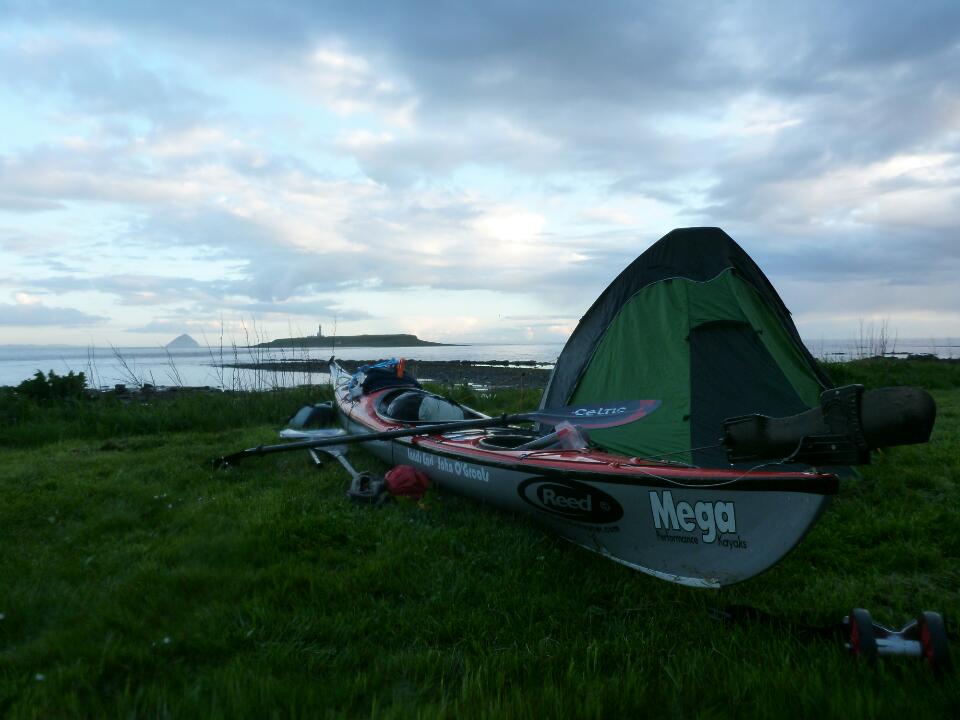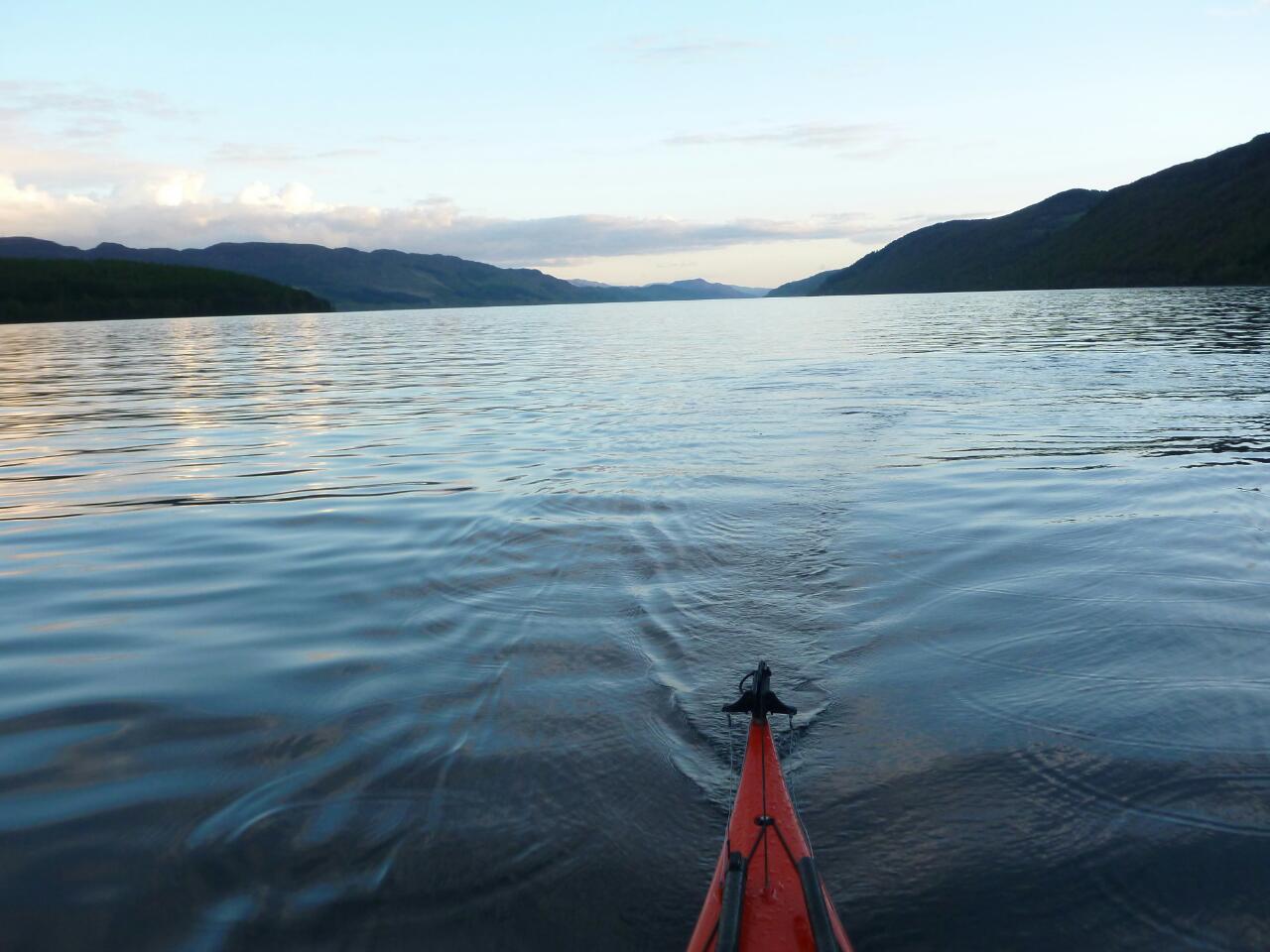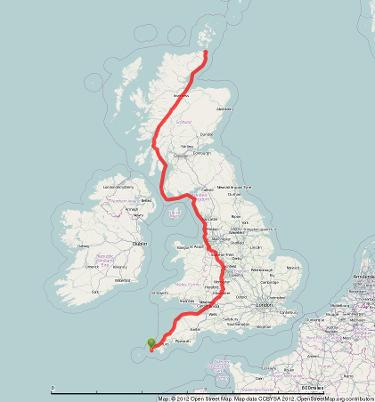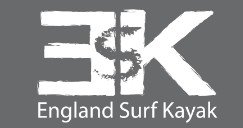Post trip #2
June 7, 2013Finally got round to my last blog post, sorry if you’ve been waiting for it but I’ve been busy since getting back, and all thoughts of the trip are disappearing into normal work, so I thought I’d better make the effort and get the blog finished. If you have no interest in paddling, this blog post is not for you. Even if you do have an interest in paddling this blog post may be the perfect sedative to help you drift off to sleep. I struggled to stay awake writing it so best of luck….
Most of the equipment that I used on the trip I sourced and bought, there were a few exceptions where I was supported by very generous sponsors, but only with items I would have chosen to have purchased anyway. So what you should get here is what I genuinely think about the products I used rather than me just saying nice things about free stuff….
The Boat
Was ace.
Not really sure what else I can add, it was comfortable, it was quick enough to cover my kinds of mileage, it held me (110kgs) and all my kit, and stayed above water! It was strong, in that it survived being wrapped around a rock with only relatively minor repairs given how hard I hit it, and it was well behaved, in every wind and swell combination it proved to be predictable and reliable. I really loved it!
The slight changes I made to the standard boat were,
- Fitting a Kayaksport navigator rudder instead of a skeg, this was without doubt one of my best decisions, the ability to just generate forwards momentum and let your feet deal with steering, I would say is an absolute must for long distance expeditions.
- Adding split mountings on my front and rear deck to give me maximum loading options.
- I didn’t have the day hatch bulkhead fitted, I thought this would give me better loading options as I knew that the whole boat would be loaded all the time, as it transpired I could have probably had it in and it wouldn’t have made any difference.
Other than that it was a standard construction off the shelf
boat, and although it’s no longer in showroom condition it survived being
dragged around 150 locks, and bent around Boscastle’s finest reefs
exceptionally well!
Paddles
I was really fortunate to get support from Celtic paddles before my trip. I was apprehensive about changing blades close to the start of the trip, as it’s a bit like putting on new shoes, they look like your old shoes but don’t feel like them.
The slightly sad thing is these blades were so much better than my old ones in every way it made me realise I should have changed years before.
I took two very different styles of blade with me, both of them were set up with the lever-lokk system allowing feather and length adjustment. I paddled mostly on 30 degrees, but adjusted the length dependant on time of day! I started the day short to have a higher cadence with less resistance until everything was warmed up, I’d then fully extend to get the most drive, and at the back end of the day I’d reduce the length again to warm down for the last few miles. Bearing in mind that it is always a shock to the body putting in these sorts of mileages day after day, I had no significant issues with my wrists, suffering only a slight niggle on the final day after three days of heavy headwinds and over gripping, which is testament to the blade set up.
The Celtic 700
This was the bread and butter blade, I used it all the time when conditions were a little more challenging, powerful, solid in the water, light, did everything I wanted it to. It suited my mid paddling style, and was thoroughly enjoyable to use.

Lendal Kinetic Hybrid wing
This got used whenever I could. It has huge power based on the almost skeletal paddling technique it promotes. The real advantage of this blade was how different it was to the other one, changing blades felt like having a rest day, as the main muscle groups utilised were sufficiently different. It is significantly heavier than the Celtic blade (the Celtic is exceptionally light) but that extra swing weight promoted a better wing technique for me.
Softwear
Baselayers
I was slightly technical in my choice of baselayers, in that I strayed away from paddling kit! I used Nike Combat Pro base garments. These are compression products and help your muscles do what they’re supposed to, they worked well for me. I then had Reed Transpire fleece, either an all in one suit, or just the top if it was warm and I was wearing shorts. This kit is absolutely superb, it’s warm, fast wicking, and dries superfast if you get it wet.
Outershell
Nookie Bib Drypants – These worked really well, they gave out at about 800miles where they developed small leaks through wear points. I had problems with them earlier in the trip but it turned out the lack of rinsing them had caused them to be not breathable anymore. A quick dunk and dryout solved the problem.
Nookie Storm Cag – This was comfortable, well articulated, provided plenty of room, great hood and collar to hide in. The only problem I encountered with it was with the over cuffs on the wrists where the material rubbed against my wrist until it started to bleed. I’ve got scars on the insides of both wrists from it. I overcame it by rolling the over cuff back which worked fine. Retained its waterproof abilities for the duration of the trip.
Reed Aquatherm Coverall – This was designed to go over everything if I got cold on the water, and also to be a spare deck as it has one as part of the design. I actually wore it on quite a few days as a standalone cag as I found it so comfortable to wear. It was bombproof and dried quickly. Highly recommended.
Reed Aquatherm Deck – I started the trip with a Play boater touring deck but swapped to a Reed one when I arrived on Anglesey, as I wanted something drier! Lightweight, comfortable, and dry, everything you’d expect from a deck.
Palm Kaikoura Buoyancy aid – Really comfy, with loads of very clever design features, I used the water pocket on the back for the first few days, but soon swapped to having the water carried on the deck to reduce the weight hanging off my shoulders! Never really noticed I was wearing it, which is surely the sign of good design.
Teva Nilch shoes – These survived 900miles on glass fibre
without wearing though! The two wear points on the outside of the heels are
really well reinforced, and although worn, have life left in them.

Flat Earth Sail
I had really high hopes for the sail, but in actual fact it
was slightly more faff to have it on deck than the benefit it provided. I used
it for sections on about 5 days of the trip, when it was really helpful. It’s
like having another gear, you still paddle but all the weight of the boat has
been taken away. The problem I had with it was that the downward pressure on
the bow was lifting the stern, causing the boat to require real efforts to stop
it weather cocking. This didn’t happen when the winds were lighter which was when
I managed to use it. The fixes for this would have been to either, carry less
kit allowing me to be cleverer with my weight distribution, or paddle a bigger
boat, neither of which were possible so it spent most of its time on my deck
taunting me.
Trolley
I started the trip with a Handikart. This was brand new at
the beginning of the trip, but by Anglesey the wheels had split the axles kept
heating up allowing the male clips that hold the wheels on to fall out. Although
this sounds woeful, it had worked really hard in getting round all the locks
etc. and I was intending to carry on with it after some DIY repairs. But my
visit to the symposium resulted in finding the perfect trolley, small, light,
really solid no breakable parts. The lockkeepers on the Caledonian canal were
very interested in it as they have real problems with the trolleys they have
for people to use. I’d now love to tell you what it’s called but I have no idea…
But I do know that the nice people at Celtic Paddles stock it, you can see it
in the foreground of the camping photo further down the page.

Camping
Tent
I used a Mountain Equipment 4 pole Geodesic tent. The best
thing about it was the fact the outer and inner could remain attached so
putting it up and taking it down was really a couple of minutes. The problems I
had with it were the outer and inner were too close together at the windward
end, so in windy, rainy conditions (Scotland) the tent breached and water came
in. This was then compounded by putting it away as one unit when wet, so the
water would completely soak the inner. I solved it by shoving a paddle float
inflated between the layers. I’d replace with something else if I were going
again
Alpkit Wideboy – Super comfy, tapered to take up less room. No problems whatsoever.
Sleeping bag
Mountain Equipment Firewalker III – Was great, a synthetic four season bag, so was a little heavier and bigger than I would have liked, but this was made up for when everything got damp and it remained useable! Shark design so loads of room for your feet and a hood to pull over your head, which makes an exceptionally good curtain for the short Scottish nights. I stored this in a Summit to Sea XL Event compression bag, which kept it dry and compact for the entire trip.
Cooking
MSR Pocket Rocket and Pinnacle soloist 1 person cook set –
Worked really well, super compact, pan was only just big enough for boil in the
bag foods. I carried Oats for breakfast with powdered milk, and Look What We
Found boil in the bag dinners which were really good. Bought online they have
fantastic offers, I really rate them for expedition food.

Other bits
Repair kit
Before I left Howard Jeffs very kindly gave me one of his
repair kits that he’s made up to sell, I assumed I’d never need it… but there’s
not a lot left. It had everything I could have asked for, from instant repairs of
pre cut vac bagged Denzo tape after Id wrapped the boat round a rock, to
lasting solutions with a full glass fibre kit to make permanent fixes. When I
needed it, it was the best bit of kit I had!
Attwood Pump
The Attwood and I fell out several times, it’s a self contained bilge pump with batteries so in the event of a swim I could take it out of its bag and pump the boat dry. The (good) problem was that I didn’t swim, and it always seemed to be in the way. At 3 kilos I was starting to see it as a luxury item and it nearly got removed several times. I’d never carry it if I were paddling with someone else, so I guess it was just a belt and braces approach I took to the solo experience. I checked it every day, but never used it.
Après Paddle
Clothes when not boating took a while to get right before I went. What I eventually ended up with worked really well for me. A Down Jacket, a pair of lightweight mountain trousers, a couple of T-Shirts and pairs of pants and a pair of sealskin socks. The socks allowed me to take a set of Sanuk shoes as footwear, given that the socks would keep my feet dry the shoes could therefore be lightweight and small. This all fitted into a Sea to Summit M Event compression dry bag.
Power and technology
I tried to keep power requirements to a minimum I carried
- Spot Finder – was on every day took 3 lithium AAA’s and only used 2 set for the duration of the trip
- VHF – Cobra. I took this one over the Icom one I had, as it took AAA’s I only switched it on twice to get weather, the rest of the time it sat on my deck bag in an aquapac with the spot finder, I had a tether attached to me, so should I fall out it would come with me.
- Mobile – I imported a dual sim phone to allow me to access a range of different networks by carrying three different sim cards. This worked brilliantly, always having coverage until I broke the screen… After that I had to change the cards in my spare phone, which still worked but was infinitely more faff. I carried three spare batteries for the phone and an emergency charger which took a AA battery
- Tablet – Nexus 7 as it had the greatest battery life for the most functionality without having to re-mortgage the house. I stored this with all the cables etc I needed in a Tupperware sandwich box, which provided all the protection it needed.
- Cowan X9 Mp3 player – I went with this as it had 130hrs of playback between charges. I only charged it twice on the whole trip
- Pure DAB personal radio – This was power hungry, requiring charge every day if it was used, but what it did give me was an option to listen to something alternative to music, Radio 4/5/6 were the most listened to channels, and I actually had a digital signal for most of the trip.
- I used two systems for generating power a Power monkey which on the whole was fairly lame, a full day of sunshine would provide about enough charge to half charge my phone, or fully charge my radio. The second system was a Freeloader Pro, which was much better giving some power even on cloudy days. The output was still limited though and without stopping a couple of places and charging everything up I would have struggled to keep everything going. I think in future I’d just take the one system and work on the premise that there are enough pubs/hotels I could charge at every few days.
First aid and safety kit
I carried all sorts of stuff I never needed, creams and lubricants etc. I taped my fingers up on days three and four, but after that I never needed anything, fortunately.
I had two paddle floats, one which I used as a pillow and
the other to keep my tent layers apart, other than that they were unused.
Day/night flares VHF etc. all came along for the ride but never saw the light
of day.
Navigation
The boat had a Silva recess fitted so crossing were easier in terms of following a bearing, I carried a small orienteering style Silva compass in my buoyancy aid in case I wanted to take a fix or bearing. I never used it.
I printed OS maps for the whole trip on A4 at 1:75000, and charts for the crossings. I printed them on a laser printer (to stop the risk of ink run if they got wet) and laminated them, this worked really well as I could throw them away when I’d done with them, and there was no faffing around with map cases and trying to keep volumes of maps and charts dry. These were all done from Memory Map, which I had with me installed on both phone and tablet.
I combined these maps and charts with a HJ sea kayak navigation aid, which does exactly what its name suggests.
I also used the Navionics app, which was great for tidal flow information, and giving you a marine fix, I never bothered to track using it as it was too power intensive, but as a planning tool it was really good.
The other apps I used were Bluefin marine weather, which on Android is absolutely brilliant as a free app for tidal and weather info, and Windguru which, with its hourly predictions helps you make the best of the available windows of opportunity in a 24 hour period.
There were other bits and bobs that I had with me, but that is pretty much it, all of it worked, and nothing failed catastrophically. Although there would probably be a couple of changes I’d make to little things, the main kit I had worked well for me. The boat and paddles are currently holidaying at Skern Lodge Outdoor Centre in North Devon, where you are welcome to come and try them if you wish either email me on glyn@skernlodge.co.uk or call the office on 01237475992 if you’d like to try any of the kit out.
Best start planning the next trip now!
Posted by glyn brackenbury.







 Been paddling for 30 years mostly as a surf and whitewater boater. Living on the N coast of Devon and growing upon Anglesey has meant that the sea has never been more than a couple of miles away.
Been paddling for 30 years mostly as a surf and whitewater boater. Living on the N coast of Devon and growing upon Anglesey has meant that the sea has never been more than a couple of miles away.
